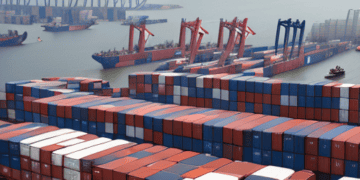China’s primary trade promotion organization, the China Council for the Promotion of International Trade (CCPIT), reported on Tuesday that global economic and trade frictions intensified in November 2023. Major economies, including the United States, have introduced more restrictive measures. In response, the CCPIT announced plans to enhance trade promotion efforts in 2024, including organizing overseas trips for over 1,000 business delegations, aiming to stabilize trade amidst these challenges. Trade experts anticipate that the external environment for China’s foreign trade will likely face further difficulties in 2024, marked by decreasing demand and increasing protectionism. However, they maintain that China’s inherent advantages and resilience in trade will persist.
During a press conference, the CCPIT revealed its economic and trade friction index for November 2023, indicating a continuing upward trend in friction. The index, which assesses 20 countries and regions, including China, the US, and the EU, increased by 29 points year-on-year, reaching 170. The value of trade impacted by friction rose 8 percent from the previous year, although it saw a 41.8 percent decrease compared to the preceding month. The CCPIT’s survey found that the countries and regions it tracks initiated 29 tariff measures, 21 trade remedy investigations, eight trade restrictions, and 156 other restrictive measures, with Brazil, the US, and Mexico being the most active. The sub-index for trade friction involving China remained high, with notable friction also observed between Brazil and the US.
Experts pointed out that the rise in economic and trade friction is largely due to increasing protectionism in various countries, particularly the US. Despite these challenges, China, as the world’s largest trading nation, continues to play a significant role in stabilizing global trade. Li Yong, a senior research fellow at the China Association of International Trade, commented on the China-US trade friction, attributing it largely to US protectionism and its broad application of ‘national security’ concerns in targeting China. He noted that China-US trade cooperation has been influenced by US politics, suggesting that the trend of increasing friction is likely to continue.
The World Trade Organization (WTO), in its global trade outlook released in October, revised its estimate for global trade growth in 2023 to 0.8 percent, down from 1.7 percent. Despite these global headwinds, China’s foreign trade saw a growth of 0.2 percent in 2023, which officials and experts have labeled a significant achievement. Yang Fan, a spokesperson for the CCPIT, acknowledged that sluggish external demand, rising trade protectionism, and escalating geopolitical conflicts are exerting pressure on foreign trade. However, Yang emphasized China’s economic resilience, potential, and vitality. He stated that the effects of policy implementation and promotion of high-level opening-up will generate new momentum for trade development, strengthening the foundations of foreign trade and foreign investment.
To further stabilize foreign trade, the CCPIT plans to organize major trade fairs, such as the 2nd China International Supply Chain Expo, which has already attracted interest from over 100 foreign companies. The organization also aims to facilitate overseas business delegations to secure new orders and explore additional markets. Li Yong stressed the need for upgrading China’s trade sector to remain competitive in exports and highlighted that major expos would provide foreign businesses with opportunities to expand in the Chinese market.
Regarding US trade protectionism and technology restrictions, experts argue that such policies will not hinder China’s pursuit of indigenous innovation. Yao Yang, an economist and Boya chair professor at Peking University, criticized the US restrictions, asserting that they are counterproductive and will inadvertently drive China towards greater innovation. He noted that knowledge and technology are globally dispersed and no longer exclusively held by the US.
Stay informed with supply chain news on The Supply Chain Report. Free tools for international trade are at ADAMftd.com.
#ChinaTrade #CCPIT #GlobalTrade #EconomicFriction #TradeProtectionism #ForeignTrade #TradeGrowth #Innovation #ChinaUSRelations #TradeFairs #SupplyChainExpo #BusinessDelegations #GlobalEconomy #WTO #EconomicResilience #GeopoliticalChallenges















